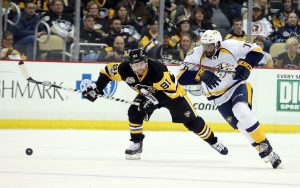
It’s about time to bestow San Jose Sharks forward Patrick Marleau with a new nickname – “Magic”. Why Magic? Because when it’s time to step out on stage, Marleau disappears.
Marleau received a lot of heat after Game 5 from former teammate Jeremy Roenick for playing what Roenick referred to as “gutless” hockey for his performance in the Conference Semi-Finals against the Detroit Red Wings. At that point, had managed to become invisible on the ice for long stretches of time for the Sharks – which was evident by the fact that Marleau finished the seven game series with only one point.
Marleau’s only point of the series ended up becoming the game-winning goal of Game 7, but spare me the theatrics and don’t believe for a second that Marleau was “answering” his critics with that play. If you think so, take a look at the video again.
The play develops as a three-on-two with Dan Boyle handling the puck while entering the offensive zone. Where’s Marleau? Oh, that’s him along the weak side sneaking in behind the defense to the side of the goal. He isn’t going to a “tough area”, he isn’t going to the front of the net to create traffic and make it difficult for Jimmy Howard to make the save or control the rebound. Instead, he goes to the far side goal post and luckily he gets a freebee of a goal when the puck squirts loose right in front of him. Right place at the right time? Sure. Answering his critics? Hardly.
You can go ahead and think that I’m just a bitter Red Wings fan upset over the Game 7 loss at the hands of the mighty Sharks, but the truth is that the numbers don’t lie. In fact, Marleau only has six points in 13 playoff games so far for an average of 0.46 points per game – a far cry from the team leading 73 points that he posted during the regular season – an average of 0.89 points per game. So what accounts for a nearly 50 percent disparity between regular season and playoff points per game averages? Marleau simply doesn’t have that killer instinct, that competitive edge and that second gear that other players push themselves to during the post season. Some players get better when the playoffs strike, others simply fade into the shadows.
Take a player like Pavel Datsyuk for instance. Anyone who has watched Datsyuk knows that he does amazing things with the puck. He is one of the most gifted playmakers in the game during the regular season, but during the playoffs he finds a second gear and still manages to ratchet up his game another notch. During the regular season, Datsyuk averaged 1.05 points per game. During the playoffs Datsyuk upped the ante to 1.36 points per game. In a time when points come at a premium, Datsyuk actually provides more offense.
But Datsyuk is more than just a playmaker, he also makes superb defensive plays. There is a reason why Datsyuk has won the Selke Trophy three years running and is a finalist for the trophy again this year. Datsyuk is a difference maker on both ends of the ice during every shift of every game.
Need another example? How about Martin St. Louis, another player who finds a way to play even better in the post season than he does in the regular season. Ryan Kesler, Zdeno Chara and Niklas Lidstrom are also prime examples of players who transition their regular season achievement into post season success.
This isn’t about San Jose verses Detroit. The better team won the series, although they weren’t better by much. Detroit put up a great fight until the very end. What this is about is San Jose’s top players being the best players on the ice night in and night out every shift of every game. Joe Thornton has started to shed his label as a post season underachiever, but “Magic” Marleau needs to do more than tap in a gimme to shed his.


